Have you ever met people who use you for their own selfish gain? People who call you and pretend to be nice to you and then disappear when you need them or want to hang out with them?
If you have, you’ve probably met people who don’t understand that friendships are a two-way street and that they require an equal investment from both parties.
We’re talking about an investment from you, followed by investment from them.
This is how healthy relationships are supposed to function. You give something and then you get something in return.
And of course, there are no relationships that are completely balanced in this regard, but the fact that you recognize an imbalance in your relationships means that something fundamental is wrong with the give and take dynamics in your relationships.
It’s your responsibility to pick up on it and do something about it.
So if you notice that certain people are using your services, skills, knowledge, money, time, or reassurance without giving you the same in return, you probably don’t want to keep enabling these people to keep using you.
If you let them do as they please for the sake of being nice to them, you’ll unintentionally show them that you’re a pushover with poor self-esteem and encourage them to keep coming back for more.
You’ll basically trap yourself in an uncomfortable position and eventually begin to wonder if they’ll think poorly of you if you suddenly stop talking to them.
This is the kind of psychological effect users, abusers, cheaters, narcissists, and people who guilt-trip others can have on you. They can give you the impression that you’re the bad person for causing drama and for wanting to end the relationship.
But don’t fall for it.
The truth is that if the people in your life don’t feel bad for using you, you shouldn’t feel bad about letting go of them either. You have the right to be happy just like everyone else.
This means that you can (and should) get rid of people who use you for their selfish gain and make you feel worthless.
You will probably feel bad at first for being the one to end a relationship, but ending unhealthy, toxic relationships is morally justifiable and the most self-respectful thing you can do for yourself.
So don’t be afraid to cut users out of your life.
If they’re using you, you should end your relationship with them to protect your dignity, health, happiness, and self-esteem. The quality of your life depends on it. It truly depends on your ability to fight for your happiness.
That’s why there’s no need to feel bad about it! You should be proud of yourself for mustering up the courage to finally free yourself from the burden that’s been weighing you down and making you miserable.
To avoid feeling guilty about it, keep reminding yourself that it’s your life and that you get to decide who’s good for you and who’s not so good for you.
If you want to know how to deal with people who use you for their selfish gain in greater detail, this post will give you some tips. It will show you that you have nothing to be afraid of and that you’re not a bad person for putting yourself first.
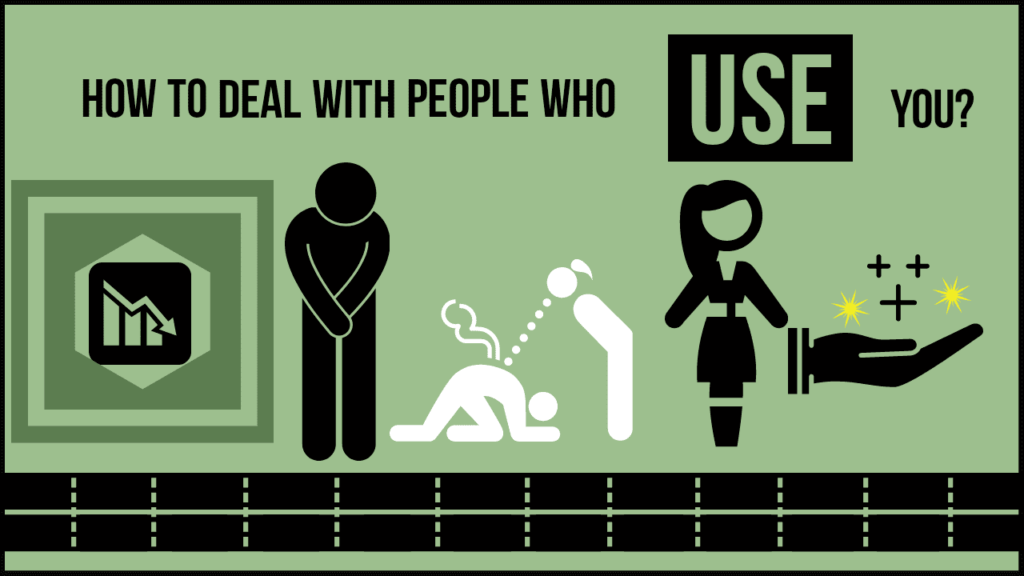

How to deal with people who use you?
The best way to deal with people who use you is to not call them out on their behavior but to tell them nicely that their behavior is hurting you and that you’d like them to be more considerate of your feelings.
Tell them that you respect them and want only the best for them, but that you require a little more care or effort from them. Make sure that you thoroughly describe the problem to them and that they understand where you’re coming from.
Your happiness is on the line, so explain everything to them in a collected manner.
To avoid triggering their self-defense mechanism, make it seem like they’ll be doing you a huge favor by adjusting their behavior and that you’ll be extremely grateful for it.
This should theoretically make open-minded people feel respected and valued—and hopefully inspire them to give you more of that which you need.
Make sure to remind them once or twice a week that you’re happy with their changes. If you do, you’ll encourage them to treat you fairly and (provided that they want to change), actually help them change for the better.
But if the people who use you don’t want to change despite multiple requests to change, then don’t force these people to change. The best thing you can do is to tell them that you’ll be busy working on personal matters for the next few months and that you want to focus on yourself.
Upon saying that, distance yourself from them and don’t reach out.
Completely disconnect yourself from their lives and they’ll probably leave you alone. If they didn’t care about you before when you needed them, they likely won’t care about your problems now.
Just make sure that the things you need to work on sound bigger than the users can handle. If they appear intimidating, stressful, and time-consuming, you likely won’t even have to ask the users to leave your life.
You’ll unintentionally weed them out and become happier as a result.
And that’s how you deal with people who use you. You essentially get rid of them without confronting them or telling them that you’re no longer interested in having them in your life.
Here’s a recap on how to deal with people who use you.
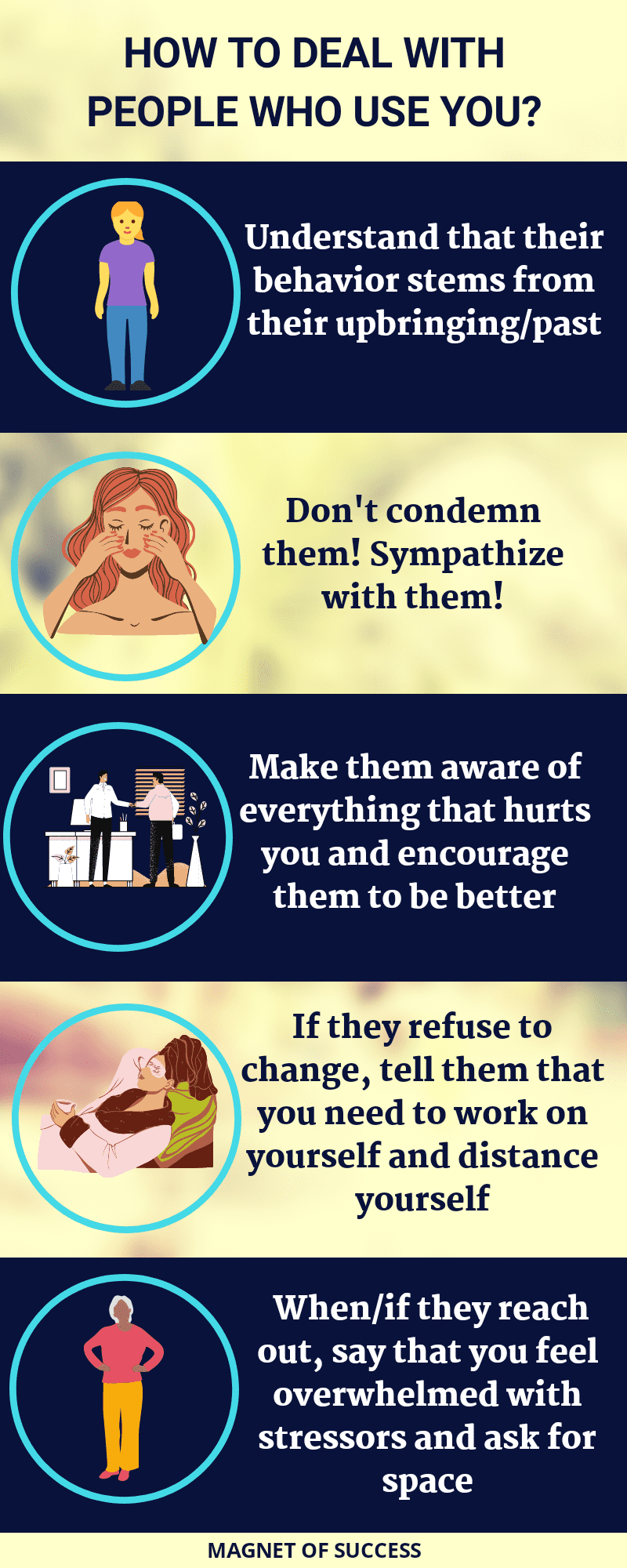

Why do people use others for their selfish gain?
The unfortunate truth is that most people who use others do so without even realizing that they’re using them. In their minds, taking from others is completely normal because they haven’t been taught from a young age that returning people’s efforts is just as important as receiving them.
This is why they merely copy their parents’ teachings and behaviors and never wonder whether their words and actions are hurting people. They never ask themselves, “Am I contributing to people’s lives enough? Am I a good friend, parent, family member, or a person?”
In their eyes, they don’t see the necessity to sacrifice more of themselves because 1)they haven’t been taught to do so and 2) don’t feel the desire and the positive feelings from being of use to people.
They essentially lack empathy and compassion—and therefore, think that their purpose on this planet is to serve only themselves.
Fortunately, the world doesn’t favor such self-centered people as it offers nothing to them in terms of satisfaction. The world only rewards those who serve others or give back to them without expecting much if anything in return.
And that’s because it makes them feel that they belong in people’s lives and that they’re contributing to the world.
This is the reason why selfless people are the happiest people in the world. They don’t have a “me mentality” and aren’t obsessed with themselves, so they typically live their lives the way they’re meant to live them – by serving others.
Society usually brands people who use others as exploiters, opportunists, or users because self-centered people always look for ways to benefit from others.
But if I had to name such people, I’d call them abusers because they abuse their relationships. They prey on people’s kindness, gaslight them—and make those who care about them feel miserable.
If you know a person who uses you, you have to understand that he or she is that way for a reason. It all started at a very young age when that person’s caregivers failed to instill proper moral values and attitudes into him or her.
When this person was just a child, he or she first developed an ego-centric attitude and (provided that he or she is now an adult), carried his or her parents’ behaviors and personal knowledge and experience into adolescence.
For that reason, you mustn’t get angry with a user and condemn him or her. Don’t get sad, miserable, or depressed either because the user is most likely clueless as to what he or she is doing wrong.
The user just hasn’t taken the time to develop himself/herself and is following his or her caregivers’ instructions. The user doesn’t know better.
What do users think and feel?
People who use others for their selfish gain have only one thought in mind; “How do I benefit from people by giving them as little as possible in return?”
They may, of course, not actually think this exact phrase or verbalize it out loud because that would mean that they’re narcissists, but their subconscious behavioral patterns nonetheless drive them to get what they want with minimum effort.
This way, they always make sure that they themselves are content first and that others may or may not get their turn to be happy after. If they don’t feel like helping people or returning the favor right away, egocentric people usually come up with some kind of excuse and take a raincheck.
They say that they’ll make it up to the people they’re bailing out on in the future and quickly put their focus on themselves again.
In summary, people who use others may not be aware of the fact that they’re being unfair and that they’re draining people of life. They normally get so caught up in their own lives that they think they’re repaying the people who love them in other ways.
In ways that have nothing to do with the relationships.
Why are people so selfish?
Before, I used to think that people are selfish because we tend to act in our best interests and oftentimes intentionally and unintentionally hurt others.
But now I realize that calling the whole human race selfish is wrong and that most people are neither selfish nor selfless. Most of us just do what’s best for us because we want to live our short, yet meaningful lives with purpose and joy.
And there’s nothing wrong with living that way as living a passionate, ambitious, and self-fulfilling life shows that we love and value ourselves. It shows that we don’t take life too seriously and that we want and expect our lives to keep getting better.
But this doesn’t mean that we should make our lives better by deceiving and using others for our selfish gain. Such ill-mannered behavior proves that we’re so laser-focused on our thoughts and feelings that we don’t care what others think and feel.
And this is very, very morally wrong.
Keep in mind that it’s perfectly normal to want the best for ourselves and our loved ones, but it’s not normal to put others down and refuse to help them achieve their goals just because we feel envious.
If you ever find yourself in a situation where you could help someone and the thought of your friend having something you don’t makes you feel envious, remind yourself that whether you help this person succeed or not, his or her success is not going to make your life any worse.
Your friend will be happier, that’s for certain. But that doesn’t mean that you should be envious of that happiness and want it all for yourself. You should celebrate it with your friend because that way, you’ll feel happy too!
You’ll overcome your envy and realize that life is not a competition. It’s a team effort and everyone willing to help is invited.
No matter what part of the world you live in, you probably regularly encounter people who love taking advantage of others’ kindness, love, and generosity. Such people will stay loyal to you for as long as they can benefit from you.
They’ll probably make good friends for a while too.
But when they discern that they can no longer benefit from the relationship and think that they can get more from someone else, that’s when they’ll start to reject you or in one way or another, show you that they’re not interested in friendship anymore.
If you deliberately or indeliberately anger them, they might even stab you in the back and show you how little you mean to them. So be careful and stay on your best behavior around people you don’t fully trust.
The story of fake friendships
A few years ago, I was on a bus to London when a person (we’ll call him John) asked if he could sit next to me. Out of politeness, I grabbed my belongings and replied with “Of course you can” and scooted next to the window.
Immediately, I noticed that John had many tattoos and that some were quite bizarre, so I struck up a conversation about them. I told him that they looked cool and asked if there was a meaning behind them.
That’s when I found out that John who was in his early forties had recently suffered two consecutive heart attacks and that he’d been pronounced dead for a short time.
He said that his family had already said their goodbyes, but that he felt his time hadn’t come yet, so he woke up and swore to live his life with great enthusiasm. John said that his tattoos are a reminder that he must make the most out of his life.
Upon hearing of his death, my heart immediately dropped. I’d just lost my uncle to a heart attack who was also in his forties and it made me think that life is so incredibly precious and that most of us take it for granted.
We don’t realize the gift that life itself is until we’re on the verge of losing it.
John’s battle for life was only half of his story, though. The other half was about the difficulties that John faced as a result of his health complications. John told me that life after the double heart attack was “hell” as he could no longer work and pay his mortgage.
Without feeling sorry for himself, he said he’d lost the property he lived it and became homeless. He had nowhere to go because the thirty-something friends he had, were suddenly nowhere to be seen.
Out of all his friends, only 5 of them had visited him at the hospital. And out of 5, only 3 had invited him to stay with them in their homes after John had lost his house.
The realization that most of his friends weren’t real friends sank very deep in John’s mind. He just couldn’t believe that most of his so-called “friends” weren’t willing to come to his aid when his life and home were hanging by a thread.
That’s why John also got tattoos that remind him every day that he only has a few good friends and that he should cut out those who only pretend to be his friends.
I didn’t know much about John’s personal life at the time and still don’t, but John assured me that he wasn’t a drug addict or someone who used his friends financially before.
He was simply a man who worked hard and maintained healthy friendships.
The moral of this story is that you can see who your real friends are when you need their help with something very important. Something that requires them to sacrifice some money, time, or effort for you.
I hope that this article has taught you how to deal with people who use you and abuse you. If it has or if you have your own story to share, leave a comment below.

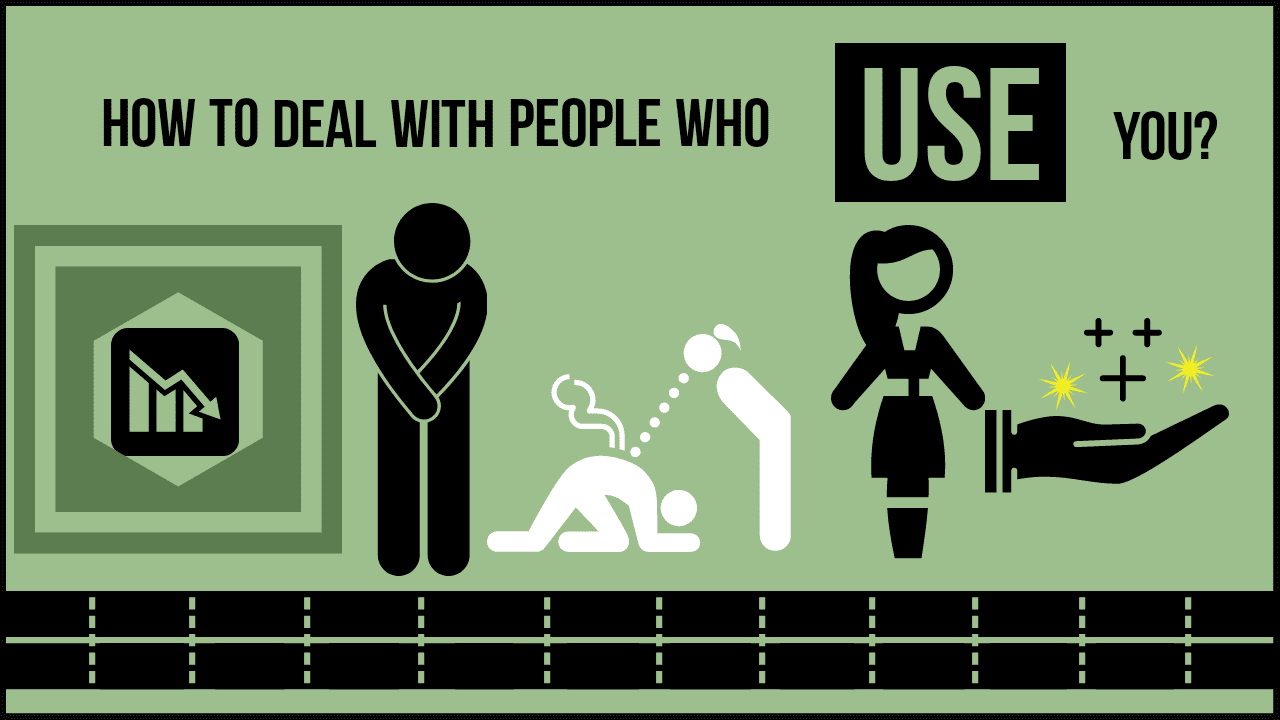
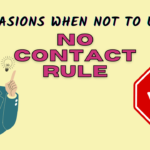
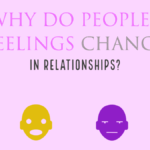
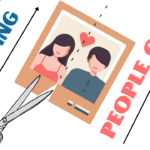
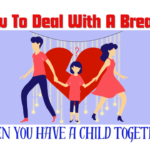
BEEN WITH AN ABUSIVE FRIEND for 6 years constantly asking for favors and making promises of good outcomes which never came… after a while good fortune befell upon the person and i was happy for that person but alas squandered the opportunity which seemed he/she didn’t even cared for the effort time and money spend to improve the situation. then lately pestering me to help that person again. i just gave up. and cut the person out of my life
Hi Jirald.
I hope your life has been better since you’ve cut that person off.
Kind regards,
Zan
Hi Zan thank you for another wonderful article! a while ago I went through a cleaning process and I cut off a few people from my life. I had a coworker who I thought it was my friend, we used to go out for lunch everyday, sometimes for drinks, spend birthday together, bqq’s, our girlfriends got along very well, you know the whole package.
Then I started to think about the relationship and I realised that many times when I needed a favour he wasn’t there for me, he even offered to help me refurbish my house when I bought it, which He never did, even though I mentioned him I was working in the house. Then I started to think about all the people I loosed contact with because of him (comments he made or stuff like that and people stopped talking to me, because I hang out with Him)
So I decided to cut that out of my life.
It’s sad to realise people you thought were your friends, people that was supposed to support you and be there, were just fakes.
But’s better to do that sooner than later.
All the best from Chile.
Tom
Hi Tom.
As you know, you find out who your real friends are when you need them the most. That’s when they show you their true colors – how they behave when they have to sacrifice a tiny part of them.
I’m sure that you’ve learned this lesson and that you’re happier now that you’ve cut the guy out of your life.
Kind regards,
Zan
Thanks for the article. I really needed this as I’ve had many so called “friends” who always end up showing their true colours and me having to cut them from my life. The worst ones were the ones I’ve been friends with for years and having numerous conversations with them never changed their ways. I had no choice but to cut them out. Recently cut one off a few months ago after being friends for about 6 years. One sided friendships just don’t cut it with me. I always give people 2nd chances but not anymore. I’m getting too old to be constantly telling people what they already should know they’re doing wrong.
Ps sorry about your uncle
Hi Chris.
You did the right thing. You’ve expressed yourself that you’re not happy and that you’d like them to change, but they didn’t listen. So you had no choice but to cut them out and focus on yourself.
I hope that you’re happier now and that you’ve got/made some friends who are there for you through good and bad.
Kind regards,
Zan
Wow Zan this article made me think a lot about life in general and about people that we spend time with! Thank you for the most amazing topics and I’m so sorry for your uncle 🤍
I’m glad the article helps, Linda.
And thank you for your sympathy!
Zan